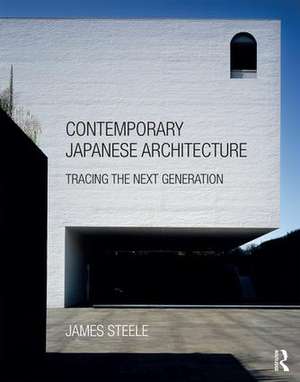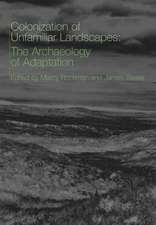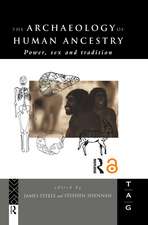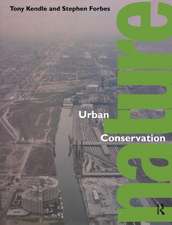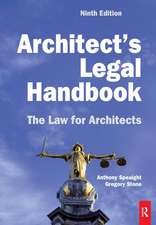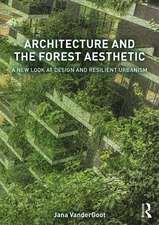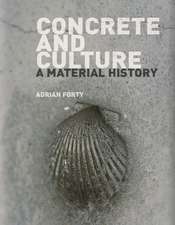Contemporary Japanese Architecture: Tracing the Next Generation
Autor James Steeleen Limba Engleză Paperback – 24 mai 2017
| Toate formatele și edițiile | Preț | Express |
|---|---|---|
| Paperback (1) | 362.83 lei 22-36 zile | +45.23 lei 6-12 zile |
| Taylor & Francis – 24 mai 2017 | 362.83 lei 22-36 zile | +45.23 lei 6-12 zile |
| Hardback (1) | 997.84 lei 43-57 zile | |
| Taylor & Francis – 18 mai 2017 | 997.84 lei 43-57 zile |
Preț: 362.83 lei
Nou
Puncte Express: 544
Preț estimativ în valută:
69.44€ • 72.22$ • 57.32£
69.44€ • 72.22$ • 57.32£
Carte disponibilă
Livrare economică 24 martie-07 aprilie
Livrare express 08-14 martie pentru 55.22 lei
Preluare comenzi: 021 569.72.76
Specificații
ISBN-13: 9781138941250
ISBN-10: 1138941255
Pagini: 302
Ilustrații: 8 Line drawings, color; 209 Halftones, color
Dimensiuni: 219 x 276 x 19 mm
Greutate: 1.04 kg
Ediția:1
Editura: Taylor & Francis
Colecția Routledge
Locul publicării:Oxford, United Kingdom
ISBN-10: 1138941255
Pagini: 302
Ilustrații: 8 Line drawings, color; 209 Halftones, color
Dimensiuni: 219 x 276 x 19 mm
Greutate: 1.04 kg
Ediția:1
Editura: Taylor & Francis
Colecția Routledge
Locul publicării:Oxford, United Kingdom
Public țintă
Postgraduate, Professional, and UndergraduateCuprins
Acknowledgements. Introduction: The (Dis) Continuities of Japanese Architecture. Part 1: An Enduring Cultural Framework. 1. The Land and its People. 2. History and Religion. 3: Paroxysm and Change. Part 2: From Modernity to Modernism: 1869-1940. 4. The Search for Knowledge and its Consequences. 5. Modernism Sidetracked on the Road to War. Part 3: From Re-birth to Economic Collapse. 6. Post-War Reconstruction, From Survival to Recovery: 1945- 1950. 7. The Le Corbusier Syndrome. 8. Metabolism Revisited. 9.Expo ’70: A Joyful Vision of a New World. 10. The Shinohara School. 11. Post-Modernism: Apostasy or Prophesy? 12. A Decade of Excess: Life Inside the Bubble. Part 4: Transitional Figures. 13: Witness to War. 14: Conflicting Identities. 15: Relief and Rebuilding. Part 5: The Next Generation. 16. Doing More With Less. 17. On the Surface. 18. Intersticial Space: The New Engawa. 19. Reinventing Modernism. 20. Technology As Nature. 21. Searching for the Sublime. Notes. Bibliography. Glossary. Index.
Recenzii
'James Steele has written an immensely well researched, insightful and scholarly work on the genealogy of contemporary Japanese architecture and in the process of unravelling this, he demystifies the architecture and explains in depth the ‘whys’, the ‘hows’ and the ‘whats’ of modern Japanese architecture since the Second World War. The book is not just invaluable for architects seeking to understand Japanese architecture, it is sine qua non for those in the humanities seeking to understand the Japanese mind and culture through the medium of architectural studies.' - Ken Yeang (Dr.), Principal, T.R.Hamzah & Yeang Sdn. Bhd. (Malaysia)
Notă biografică
James Steele is an architect who received both his bachelor’s and master’s degrees from the University of Pennsylvania, and practiced in the Philadelphia region before accepting a position at Dammam University in Saudi Arabia where he taught for eight years. He then served as Senior Editor at Academy Editions, and taught at the Prince of Wales’s Institute of Architecture in London before relocating to the University of Southern California School of Architecture in 1991, receiving a PhD in Urban Planning and Development at USC in 2002. Professor Steele has taught history and theory as well as design studio, and also organized the first Foreign Studies Program for architecture students in Malaysia in 1998. He administered it up through its fifteenth and final session in 2013 and then founded and became the director of a new undergraduate program in South America, based in Sao Paulo, Brazil. He has written extensively on contemporary architecture and has been a guest critic and speaker at numerous universities in the United States and internationally.
Descriere
By combining illustrations with timelines and graphics to explain complex ideas, the book is accessible to any student seeking to understand contemporary Japanese architecture.
